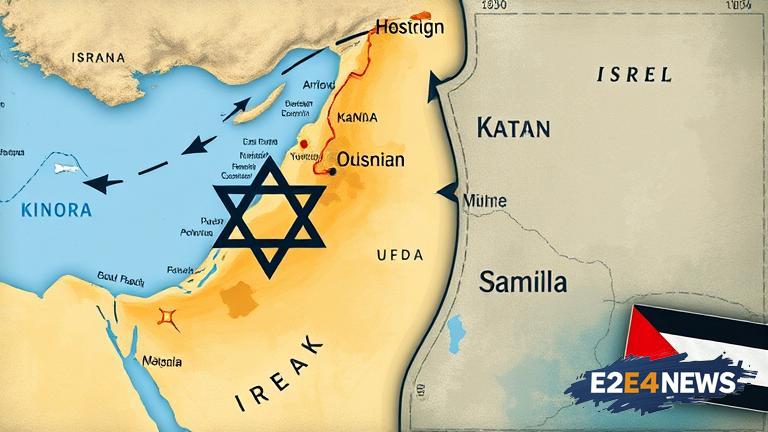The concept of a ‘Greater Israel’ has been a longstanding goal for some Israeli politicians and activists, who envision a state that encompasses not only the current territory of Israel but also the West Bank, Gaza Strip, and other surrounding areas. This expansionist ambition has been a major point of contention in the Israeli-Palestinian conflict, with many Palestinians viewing it as a threat to their very existence. The pursuit of a ‘Greater Israel’ has significant implications for the region, including the potential for increased conflict, displacement of populations, and destabilization of neighboring countries. The international community has expressed concerns about the impact of Israeli settlement expansion on the peace process, with many countries calling for a halt to construction in the West Bank and East Jerusalem. Despite these warnings, Israel has continued to build and expand settlements, leading to increased tensions with the Palestinian Authority and other Arab states. The situation is further complicated by the presence of extremist groups, such as Hamas and Hezbollah, which have vowed to resist Israeli expansionism through violent means. The United States, a key ally of Israel, has been criticized for its role in enabling Israeli settlement expansion, with some arguing that its policies have emboldened Israeli leaders to pursue their expansionist goals. The European Union, on the other hand, has been more vocal in its opposition to Israeli settlement expansion, with many member states calling for a boycott of Israeli products made in the West Bank. The pursuit of a ‘Greater Israel’ also has significant implications for the region’s demographics, with many Palestinians facing displacement, marginalization, and exclusion from their ancestral lands. The Israeli government has been accused of implementing policies aimed at reducing the Palestinian population in certain areas, such as East Jerusalem, through measures such as home demolitions and residency revocations. The international community has a critical role to play in preventing the pursuit of a ‘Greater Israel’ from destabilizing the region, with many calling for a renewed commitment to the two-state solution and an end to Israeli settlement expansion. The United Nations has been at the forefront of efforts to resolve the Israeli-Palestinian conflict, with many resolutions and initiatives aimed at promoting a peaceful and just solution. However, the pursuit of a ‘Greater Israel’ remains a major obstacle to peace, with many Israeli leaders refusing to compromise on their expansionist goals. The region is also home to a number of other conflicts and tensions, including the Syrian civil war, the Yemen conflict, and the ongoing rivalry between Saudi Arabia and Iran. The pursuit of a ‘Greater Israel’ has the potential to exacerbate these conflicts, drawing in other countries and leading to a wider regional conflagration. The economic implications of the pursuit of a ‘Greater Israel’ are also significant, with many countries in the region facing significant challenges in terms of poverty, unemployment, and inequality. The Israeli economy is heavily dependent on the United States, with many Israeli companies relying on American investment and trade. However, the pursuit of a ‘Greater Israel’ has the potential to damage Israel’s economy, as well as those of its neighbors, by leading to increased conflict and instability. The environmental implications of the pursuit of a ‘Greater Israel’ are also significant, with many areas in the region facing significant challenges in terms of water scarcity, pollution, and climate change. The Israeli government has been accused of implementing policies that prioritize the interests of Israeli settlers over those of the Palestinian population, leading to significant environmental degradation in areas such as the West Bank. The pursuit of a ‘Greater Israel’ is a highly complex and contentious issue, with many different perspectives and opinions on the matter. However, one thing is clear: the pursuit of a ‘Greater Israel’ poses significant risks to the region, and it is imperative that the international community takes action to prevent it from destabilizing the Middle East. The situation requires a comprehensive and nuanced approach, taking into account the complex history, politics, and demographics of the region. The international community must work together to promote a peaceful and just solution, one that recognizes the rights and dignity of all people in the region, regardless of their nationality or ethnicity. Ultimately, the pursuit of a ‘Greater Israel’ is a threat not only to the region but also to the entire world, and it is imperative that we take action to prevent it from leading to further conflict and instability.
